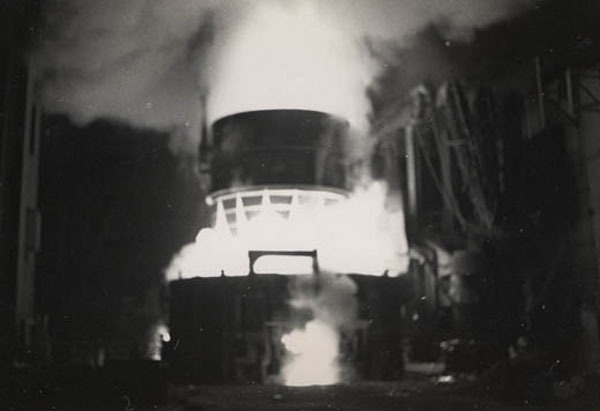La Couleur de feu
-
Réalisé par Henri Storck • Écrit par Henri Storck
-
Belgique • 1957 • 45 minutes • 35 mm • Couleur
- Réalisation :
Henri Storck - Écriture :
Henri Storck - Image :
André Bac, Jacques Moniquet - Son :
Paul Leponce, Benoît Quersin - Musique originale :
Jacques Lasry
- Production (structure) :
CEP (Cinéma-Édition-Production) - Ayant droit :
CEP (Cinéma-Édition-Production)
- N° ISAN :
non renseigné
Résumé
"Ce film a été présenté à l'Exposition universelle de Bruxelles 1958 en quatre parties distinctes projetées simultanément sur quatre écrans. Lui aussi a perdu sa couleur ce qui est particulièrement navrant car il a pour sujet même la dramaturgie du feu. Film sans commentaire, Henri Storck l'a imaginé comme un opéra et monté comme un magnifique spectacle, version moderne des forges de Vulcain. Le cinéaste est impressionné par les hauts-fourneaux, la grande coulée de l'acier en fusion, la force des laminoirs, le travail des ouvriers transformés en robot d'amiante. Il y a dans ce film un aspect de célébration lyrique, une force puissante. Il faut mentionner que ce film, un des premiers à être tourné en cinémascope en Europe, a dérouté par son format le chef opérateur qui, peu à l'aise dans les mouvements d'appareil, a principalement tourné en plans fixes. L'usine est vue comme l'antre des derniers Titans, une Métropolis industrielle, témoignage devenu historique depuis la crise qui a frappé la sidérurgie européenne."
(Fonds Henri Storck)
Il a été tiré de ce film un court-métrage intitulé Les Dieux du feu.
"This film was presented at the Universal Exhibition in Brussels (1958) in four distinct parts projected simultaneously onto four screens. This film too, has lost its colour, which is particularly unfortunate for its very subject was the dramaturgy of fire. This film had no commentary. Henri Storck imagined it as an opera and edited it like a magnificent show, a modern vision of the Vulcan forges. The filmmaker was impressed by the smelting ovens, the great flow of molten steel, the strength of the rolling mills, the work of the workers transformed into asbestos robots. The film has an element of lyrical celebration, a powerful force. It must be said that the format of this film, one of the first in Europe to be filmed in Cinemascope, disconcerted the cameraman who was ill at ease with the movements of the machine and who therefore mainly filmed fixed shots. The factory looked like the lair of the last Titans, an industrial Metropolis, a testimony that has become history since the depression hit the European steel industry."
(Fonds Henri Storck)
A short film was derived from this film called Les Dieux du feu.
Mot(s)-clé(s) thématique(s)
Comment avoir accès au film ?
-
Édition DVD
- Il n'existe pas d'édition DVD à notre connaissance
-
Accès VOD
- Il n'existe pas d'accès en VOD à notre connaissance
- Distribution
- Aide sur les moyens d'accéder à un film
